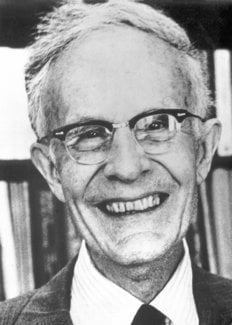Theodore W. Schultz
Biographical

The adverse economic events following the First World War turned me toward economics. In the Dakotas, where I was born (April 30, 1902), I learned during my youth how hard it was for farm families to stay solvent. Farm product prices fell abruptly by more than half. Banks went bankrupt and many farmers suffered foreclosures. Was politics or economics to blame? I opted for economics.
My schooling was disrupted by the shortage of labor during World War I. It meant foregoing high school. Then, late in 1921, I entered upon a short course in agriculture at South Dakota State College. I managed to enter college in 1924 and I was permitted to complete my college work in three years. The unorthodox economics of the University of Wisconsin during those years appealed to me. Despite my lack of proper credentials I was accepted by the graduate school. My intellectual debt to Professors Commons, Hibbard, Perlman and Wehrwein is large.
My professional apprenticeship at Iowa State College from 1930 to 1943 could not have been better; the Great Depression made it so and the talented younger economists at Ames during that period made it an exciting and profitable intellectual experience. The opportunity to consolidate and interpret that experience has been ideal for me at the University of Chicago, where I have been since 1943.
In retrospect, I value highly what I have learned about the economic behavior of rural people while abroad. During the summer of 1929, I acquired location specific information in parts of the Soviet Union. In 1960 when I was president of the American Economic Association, several U.S. economists and I were guests of the Soviet Academy of Sciences. It was a grand opportunity to return to the same locations about which I had acquired information in 1929. Over the years, I have ventured frequently into many low income countries to do what I did in the Soviet Union. In general, I avoided giving lectures or attaching myself while abroad to a university. To learn what I wanted to know, I went instead to rural communities and onto actual farms. Talk with university people, government officials and U.S. personnel stationed in the country was much less rewarding for me.
In addition, and beyond this, there is the standard puffing vita.
This autobiography/biography was written at the time of the award and first published in the book series Les Prix Nobel. It was later edited and republished in Nobel Lectures. To cite this document, always state the source as shown above.
Theodore W. Schultz died on February 26, 1998.
Nobel Prizes and laureates
Six prizes were awarded for achievements that have conferred the greatest benefit to humankind. The 12 laureates' work and discoveries range from proteins' structures and machine learning to fighting for a world free of nuclear weapons.
See them all presented here.
